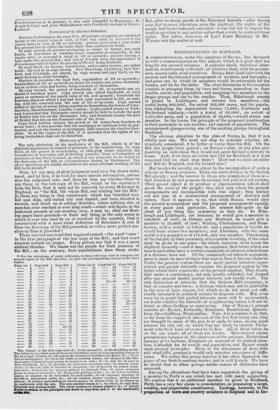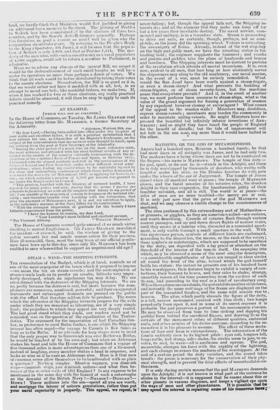REPRESENTATION OF SCOTLAND.
A CORRESPONDENT, under the signature of SIGMA, has favoured us with a communication on this subject, which is a great deal too long for our pressed columns. It contains much statistical infor- mation, industriously collected ; of which we shall, with his permis- sion, occasionally avail ourselves. SIGMA. finds fault both with the present and the intended arrangement of counties and boroughs ; and gives one by which 30 members would be returnable for the former, and 24 for the latter. The chief distinction in the counties consists in grouping them, by twos and threes, aceording to their wealth, extent, and population, and assigning two members to the larger groups and one to the smaller. Thus, Edinburgh county is joined to Linlithgow, and returns two members,—the rental being 804,000/., the extent 302,000 acres, and the popula- tion (deducting the represented towns) 73,000 ; Caithness and Sutherland similarly,—with a rental of 60,0001., an extent of 1,561,000 acres, and a population of 40,000,—would return one member. In the towns, the principle of the proposed combination is their proximity to one another, and amount of population. The arrangement changes every one of the existing groups throughout Scotland.
The obvious objection to the plan of SIGMA is, that it is a; wholly new one. We need not stop to consider whether, ab- stractedly considered, it be better or worse than the Bill. On the Bill, the people have agreed ; on SIGMA'S plan, or any plan pro- posed by an individual, they would not agree for half a century to 'come. And, if we have an entire new Bill for Scotland, is it to be supposed that we shall stop there ? Must not we have an entire new Bill for England, and for Ireland also ?
But besides its novelty, we object to the incongruities of such a scheme as SIGMA proposes. There are enow of these in the Scotch Bill already ; and the answer to those who complain of them is—
that Ministers do not propose theoretical, but practical alterations.
Their grand object is to produce a representation which shall speak the voice of the people; they alter only where the present arrangements are incompatible with that object ; they neither ask nor aim at a symmetrical arrangement of districts and voters. Now it appears to us, that while SIGMA would alter the present arrangement and the proposed arrangement equally, in every point and particular, his scheme falls quite as far short of any thing like symmetry as they do. In Edin- burgh and Linlithgow, for instance, he would give a member to 400,0001. of rent ; in Orkney and Shetland, he would give a member to 20,000/. of rent ; Stirling Clackmannan, and Dum. barton, with a rental of 310,000/. and a population of 73,000, he would have return two members ; and Aberdeen, with the same rental and a populatiln of 11 0,000, only one member. The classing of the burghs, by their proximity, is favourable to voting, if the votes must be given in one place—for which, however, there is not the slightest necessity—and it may be supposed, that towns which are near to each other have a certain community of interest, which those at a distance have not. Of the community-of-interest argument, more is made by most of those that urge it, than it has any claim to. Under the present system there are many partial interests ry heptree- settled, and people naturally examine the proposed system b lights which their experience of the present supplies. They forget, that under a constituency, not only greatly extended, but framed after one general model, partial interests can hardly exist. The only distinction of interests that the Reform Bills recognize, is that of country and town ; a division which may not be justifiable in the eyes of pure • reason, but which we do not seem yet suffi- ciently advanced in political science to dispense with. But, even were we to grant that partial interests must still le represented, we doubt whether the interests of neighbouring towns will not be found as often clashing as concurring. One of SIGMA'S groups consists of—Dysart, Kirkcaldy, Kinghorn, Burntisland, Queens- ferry, Inverkeithing, Dunfermline. Now, it is a curious f et, that, so far from the supposed into ests of the five first being one, they are thought by many of the peo; le of each, to form, on one point (almost the only one on which they are likely to trouble Parlia- ment with their local interests) to be five. All of these towns lie on the sea coast ; all of them are ferries. Queensferry claims preeminence because of the shortness of the passage, Burntisland because of its harbour, Kinghorn on account of its central situa- tion, K irkcaldy for its wealth and population, and Dysart stands upon general principles. Here, in the discussion of ferry-bills and road-bills, proximity would only minister occasions of diffe- rence. We notice this group because it has often figured in the pages of our Scotch contemporaries, and is well'known. We have no doubt that in other groups similar causes of difference have occurred.
Among the alterations that have been suggested, the giving of a member to Perth is one which has met with many supporters. We confess that if an additional member be given to Scotland, Perth has a very fair claim to consideration, as possessing a large, wealthy, and respectable constituency. Look*, however, to the proportion of town and country members in England and in Ire-
land, we hardlythink that Ministers would feel justified in giving an additional town member to Scotland. The joining of Peebles to Selkirk has been comphined of by the electors of these two counties, and by the Scotch Anti-Reformers generally. Perhaps this furnishes as good a reason as could well be given why the conjunction should take pace. By referring to the People's Reply to the King (Spectator, 41h June), it will be seen that the popu!a- t ion vf Selkirk is only 3.009, and that of Peebles 7,341. The mo- &sly of the men who, with such a constituency as a rural population of 4,1100 supplies, could ask to return a member to Parliament, is ad nirable. Were we to advise any change of the present Bill, we suspet it would be the disfranchisement of such small burghs as will have under its operation no more than perhaps a dozen of voters. We think that all such would be better distributed bytaking their votes to the county elections. Nevertheless, the Bill is so good as it is, that we would rather not have it meddled with at all, lest, in an attempt to mend one hole, like unskilful tinkers, we make two. If, when it has worked for two or three elections, any really practical defects should be observed, it will then be easy to apply to each its practical remedy.



























 Previous page
Previous page